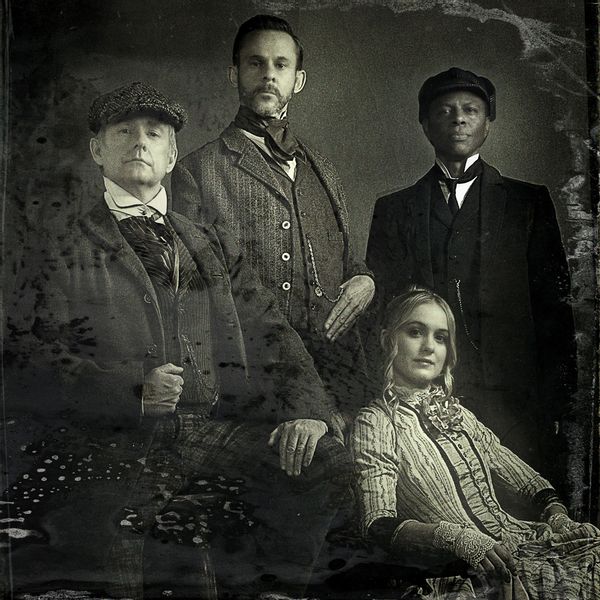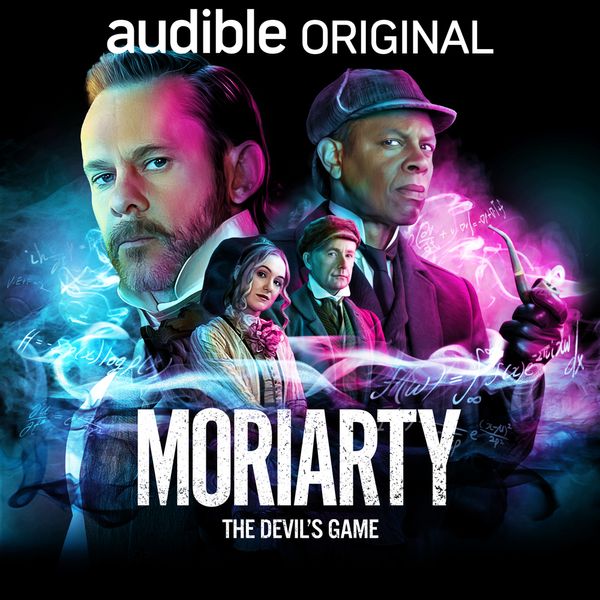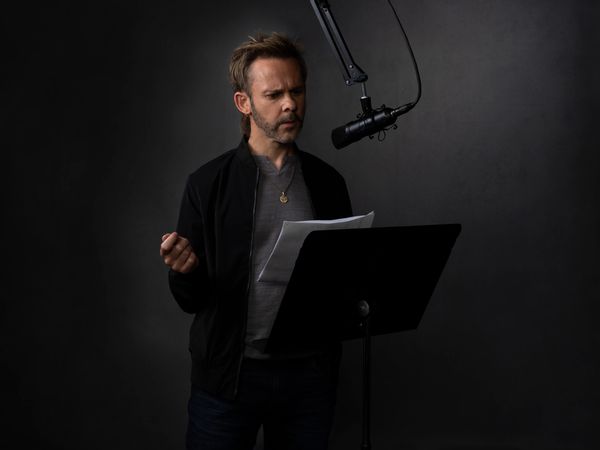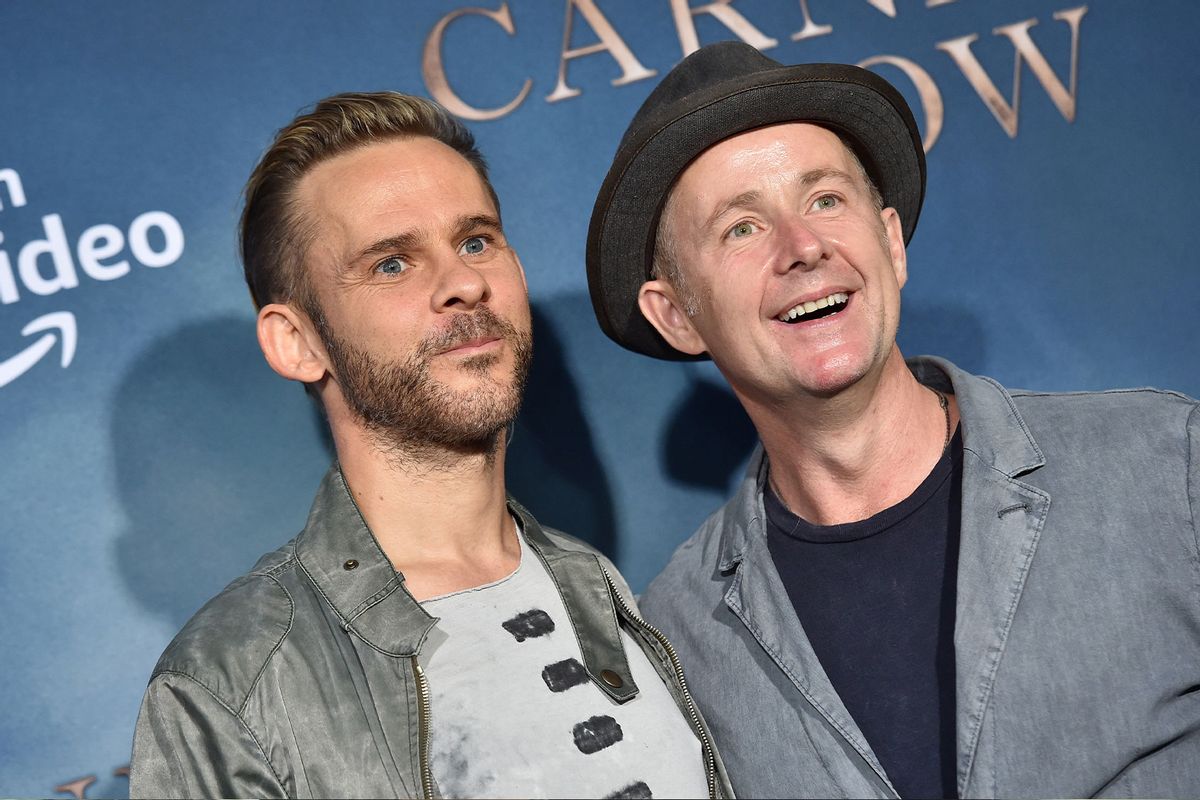Dominic Monaghan and Billy Boyd played best friends in "The Lord of the Rings." Their easy rapport as hobbits Merry (Monaghan) and Pippin (Boyd) helped make the camaraderie of the film, a fantastical story grounded in friendship, real. We rooted for them, and continued to do so after the saga's end as Monaghan and Boyd continued to stay close.
Dragons, orcs and walking trees (to my great personal disappointment) aren't real. But maybe kindness is. And maybe it can last.
Boyd and Monaghan took their friendship on the air when they started a popular podcast "The Friendship Onion" dedicated to "peel[ing] back the layers of their friendship, both on screen and off." Podcasting is a medium the two performers are both drawn to. As Boyd says, "I've always liked listening to stories, from growing up on the BBC, listening to Radio 4, growing up in Britain. I used to love that."
And now they're back together in the audio form as villains who aren't really villainous, taking on a beloved hero who perhaps wasn't so beloved after all. Monaghan stars as Moriarty and Boyd as Moran in a new scripted podcast from Audible: "Moriarty: The Devil's Game."
The show takes a familiar setting — the Victorian London of Sherlock Holmes — and characters, those who orbited Holmes in a more dastardly fashion, and places them in a new story, the characters portrayed in a different light.
"Sherlock Holmes, I'm sure, if he were a real character would be very annoying."
Moriarty (Monaghan), the longtime nemesis of Holmes in traditional tales, is the victim here. Maybe. A professor, he's wanted for a terrible crime he swears he didn't commit and has to solve the formula that's been eluding him in order to prove it. Boyd's Moran is the sympathetic Javert to Monaghan's Jean Valjean. Moran's instincts tell him something is not right with the case. Traditionally, Moran was a henchman of Moriarty's, but this story breaks from tradition, and leans hard into a Holmes character that may be closer, in some way, to something his besieged creator (Sir Arthur Conan Doyle) desired.
Monaghan and Boyd are brilliantly cast, their rapport and friendship clearly emanating from the ear pods in this "Wicked" for the detective set. They talked with Salon about the show.
This interview has been edited for length and clarity.
I wanted to start off by asking: why Sherlock Holmes? Were you a fan before? Had you read the stories?
Dominic Monaghan: I think the world of Sherlock Holmes is charming and beguiling. If you're just taking that singular character in literary history, he's highly intelligent, but deeply troubled and tortured. I think in the work of Sir Arthur Conan Doyle, he's a drug addict. He struggles in love, he struggles with his addictions obviously, but [he's] clearly a genius and the only person that can really best him or even contend with that level of intelligence is his archnemesis, Professor Moriarty. We thought, what if we look at that fascinating backdrop of the Sherlock Holmes here in London, but have a look at it through the guise of Moriarty thinking that he's the hero and Sherlock Holmes is out to get him?
 Moriarty Group (Courtesy of Audible)Billy Boyd: [Audible] came up with the great idea of taking well-known stories — and what if you twist that? Let's look at it from another character's point of view, a character maybe that you don't get to delve too deeply into. And they came up with the idea of Sherlock Holmes and Moriarty, which I think was a fantastic idea, because not to say that it's totally black and white in the books or in other tellings of Sherlock Holmes — but it's understood that Moriarty is the bad guy, and that's it. And there's probably more layers to it than that, you know?
Moriarty Group (Courtesy of Audible)Billy Boyd: [Audible] came up with the great idea of taking well-known stories — and what if you twist that? Let's look at it from another character's point of view, a character maybe that you don't get to delve too deeply into. And they came up with the idea of Sherlock Holmes and Moriarty, which I think was a fantastic idea, because not to say that it's totally black and white in the books or in other tellings of Sherlock Holmes — but it's understood that Moriarty is the bad guy, and that's it. And there's probably more layers to it than that, you know?
I appreciate that angle, because to be honest with you, Sherlock Holmes always rather annoyed me as a character. He's just a little much. Being right all the time can be a little draining.
Monaghan: Yeah, he's a little bit like my dad. Just kidding of course. Always right and always keen to tell you when you're wrong and always keen to be the smartest guy in the room. Sherlock Holmes, I'm sure, if he were a real character would be very annoying, but maybe in these situations where there is a right and wrong in terms of a crime having occurred, maybe you need someone with such a singular vision.
"They can't live their life thinking they're bad, they must live their life thinking that they're justified in everything that they do."
Boyd: Do you know the history of the writing of Sherlock Holmes is that the writer — he got sick of writing it? And people loved it so much. So, he was putting things into Sherlock Holmes to try and get people to not like him as much. The drug taking and all that was so that he could stop writing Sherlock Holmes and start writing something else. But people just loved it no matter what he did. They loved these stories.
I think the things that annoy you about Sherlock Holmes, they've probably just magnified that. So, he's a know-it-all. But in this story, if he's wrong about something or he feels strongly about something, it feels like there's nothing he wouldn't do to twist reality to make himself right or to make himself the most intelligent, the most interesting man in London. And we see him do stuff and think, "Oh, wait a minute, this isn't the Sherlock Holmes that we know."
Good. I do feel justified, I guess. Vindicated, by your podcast. So, describe the character you play.
Boyd: Moran is an ex-soldier who now finds himself in the criminal world. As Liam Neeson says, he has very particular skills, and that's taken him to a darker part of London. And I think when he meets Moriarty, he sees someone who is still holding onto his morality and goodness, and I think Moran likes that, because I think Moran feels a little bit that he's lost that, even though he hides it with jokes and bravado. But also, Moran sees a criminal mind in Moriarty, how he can think of things. He thinks like a criminal, but morally he still has this goodness. And I think Moran wants to have some of that, and he also wants to protect it. It's an interesting layered relationship that they have.
 Audible Original Moriarty: The Devil's Game (Courtesy of Audible)Monaghan: I think the classic way of viewing Moriarty is that he is the thorn in Sherlock Holmes' side. And that he is the villain, his behavior is incorrigible and that he is someone that should be behind bars and is viewed with suspicion . . . What I was interested in is that particular individual's point of view when they think "I'm doing the right thing. My actions are justified. I'm correct in what I'm doing and damn everyone else."
Audible Original Moriarty: The Devil's Game (Courtesy of Audible)Monaghan: I think the classic way of viewing Moriarty is that he is the thorn in Sherlock Holmes' side. And that he is the villain, his behavior is incorrigible and that he is someone that should be behind bars and is viewed with suspicion . . . What I was interested in is that particular individual's point of view when they think "I'm doing the right thing. My actions are justified. I'm correct in what I'm doing and damn everyone else."
"There's something about this genre, this way to storytell, that's really awakened my imagination again."
And I think James Moriarty has that view. Obviously, a very serious crime takes place at the start of the show. I won't ruin it too much for anyone that's not listened to it yet. Moriarty is at the receiving end of that crime and then is accused . . . And he feels justified to work outside of the law. I was interested as an actor in exploring someone who historically we view as being "bad," and the fact that they can't live their life thinking they're bad, they must live their life thinking that they're justified in everything that they do.
"Moriarity" is structured like an old-fashioned radio play, and you also have the podcast "The Friendship Onion." What do you like about podcasting as a medium, or what attracts you to it?
Boyd: You can play characters that you would never be allowed to play in TV, film. I can be a Russian giant. On an Audible Drama Original, I'd be able to say, "I'm 6-foot-5, and I weigh 300 pounds," you know? And I can make that believable. For that alone is wonderful.
And then if it's done right, I think it can transport you in your imagination the way maybe no other medium can. If you get the right sounds, the right actors, the right music . . . There's something about this genre, this way to storytell, that's really awakened my imagination again.
"All acting comes from the same place, so where can I find in me a truth that then will affect another human being?"
It's so evocative. I know it's just sound, but it's very sensory. You do feel in the world, with the music and the background sounds. It really does transport you, in a way.
Boyd: In "Moriarty," just the sound of the London streets brings you there.
And our brain fills in the gaps. We don't have the visuals, so there's enough senses there that our brain can fill in the gaps, which is really neat.
Boyd: Then somehow you feel more part of it then. Sometimes we're spoon-fed a little bit too much, and then it's a passive experience. Whereas if you feel part of a story, like these Audible Originals, but also onstage, if you're watching something onstage, and they don't have a big set — as Shakespeare says at the start of "Henry V," I think, he says, "When you see a horse, imagine a thousand." You have to think, "Oh, right."
And with these [podcasts] again, you hear the clicking of the carriage wheels on cobblestones. And then you have to imagine that. There's something beautiful about it. Then you're more part of the story. You're involved.
I love that. I mean, we're talking all about the benefits of it, but are there certain challenges as an actor to doing a voice-only format?
Boyd: Absolutely. All acting comes from the same place, so where can I find in me a truth that then will affect another human being? But it's done in totally different ways. In TV or even more so in film, you want to be able to just look at someone and see that truth, whereas in a [podcast], everything has to be in your voice. So, it's not about making it bigger. It's not enough just to think it and let somebody see you. You have to then articulate that in some way . . . it's to get that truth into your voice.
Back to Shakespeare again: In Shakespearian times, you didn't go to watch a play, you went to listen to a play. So, the actors had to articulate the emotion in the story.
You were probably so far back in the theater that you couldn't see very much.
Boyd: So, you had to go and listen to a play. Exactly. Exactly.
 Dominic Monaghan Behind The Mic (Courtesy of Audible)Monaghan: I think that the challenges that I faced [were the same] as any actor, which is: how can I make this character feel real? How can I make this character feel like you have been transported back into that time in London? You could be sat in a carriage with him, or on a train with him, or be sat in a pub with him. What does he wear? How does he speak? How does he walk? What would he think if someone spilled a glass of wine on him, or if someone accidentally splashed him with a puddle?
Dominic Monaghan Behind The Mic (Courtesy of Audible)Monaghan: I think that the challenges that I faced [were the same] as any actor, which is: how can I make this character feel real? How can I make this character feel like you have been transported back into that time in London? You could be sat in a carriage with him, or on a train with him, or be sat in a pub with him. What does he wear? How does he speak? How does he walk? What would he think if someone spilled a glass of wine on him, or if someone accidentally splashed him with a puddle?
"They need to rely on each other and they go through this adventure together."
How does he react to things that are not necessarily in that script? These are all ways that I try and make a character real. Obviously, there are some limitations with the radio play, where the audience can't see that person, but sometimes that can set an audience free . . . I was lucky enough to do all of my scenes with [Lindsay Whisler] and Billy Boyd in the studio. So as an actor, I was able to kind of bounce off those actors.
The challenge for me is always: can I make people believe that this person existed or is existing actually now?
What's it like to get to work with your friends?
Monaghan: It's great. It's always an opportunity that I try and take because those days are enjoyable. I'm not opposed to the getting to know you process. That's a big thing about being an actor walking onto different sets. But that is another way to drain your energy. It's that wonderful way of "What's your name? Where are you from?"
I've known Billy now for almost 25 years and we don't need that. I know how he takes his coffee. I know what time he is going to show up in the morning, I know how he's going to show up in the morning. We have a shorthand and we're also in business together in different ways. So, we know each other's families, and it's just easy.
Want a daily wrap-up of all the news and commentary Salon has to offer? Subscribe to our morning newsletter, Crash Course.
Boyd: We know each other. And it's fun to see each other do different things. And then Audible did a great thing where they insisted that we were in the studio together because a lot of time in these things, they'll record one person and then two weeks later record the other person. Whereas me and Dom arrived in the studio . . . and we worked on these scenes every day together, looking at each other, with a mic each. Otherwise, if he'd done it before me, I would've been calling him up: "Why did you do it like that? That's rubbish."
Monaghan: I think it's helpful with Moriarty and Moran, where the characters themselves very quickly need to trust each other. They need to rely on each other and they go through this adventure together. And it's helpful if you have someone in real life that you feel the same way over.
Season 1 of "Moriarty: The Devil's Game" is now downloadable on Audible.



Shares